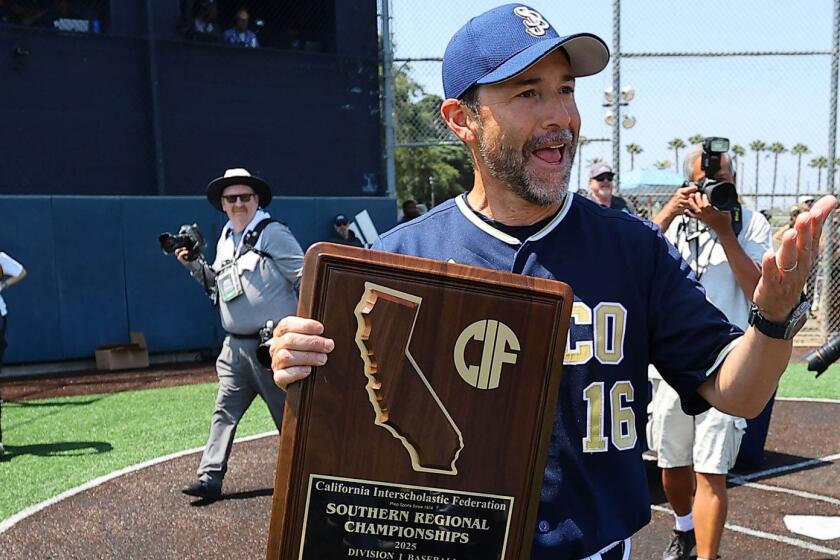Tell Us Something We Don’t Know : TIME PRESENT, TIME PAST: A Memoir,<i> By Bill Bradley (Alfred A. Knopf: $26; 442 pp.)</i>
- Share via
A Princeton-Oxford egghead, a renowned New York Knicks jock, a sober-sided liberal with a business bent . . . no wonder Bill Bradley stands not only tall, but apart in proper Washington. Since 1979, he has represented New Jersey in the United States Senate, and he is one of the few from the East who have tried honestly to fathom the West.
Last summer, Bradley joined a Democratic Party exodus that may change the character of the U.S. Senate for years, announcing that he would not seek reelection in November 1996. He said American politics was broken.
Since then, he has tantalized us with a promise to stay engaged: Maybe with his experience, his recognized devotion, integrity and, most of all, his intellectual capacity, he could help salvage the core of contemporary American society--our once proud middle class.
As a possible third-party presidential candidate or as a cerebral pathfinder outside the system, maybe he could save us from the wholly un-American idea that we must strive for wealth over decency.
When the Knicks basketball star went to the Senate, he reports in his memoir, the average wage for a high school graduate was $24,000 a year; today it is $18,000. The percentage of the work force with pension plans has dropped from half to 43%. And between 1977 to 1989, when personal income in this country grew by $740 billion, the wealthiest 1%--660,000 families-- got two-thirds.
“The two guiding assumptions of the Democratic Party for the last 40 years,” Bradley writes, “have been, first, that the middle class is in good economic shape so that it does not have to be the object of government’s concerns, and, second, that the middle class would tolerate and even support a policy that put the problems of the poor at the top of the government’s agenda.
“Today, both of those assumptions are false.”
Go Bill, Go!
The rich are doing well, of course; the poor are suffering, of course. And snake oil peddlers in government promote lotteries as a slender bridge between the two. Those used to be the extremes of American life. But not now. Now the middle class is in extremis.
So, we plunge eagerly, hopefully into Bradley’s farewell to the Senate, “Time Present, Time Past.” (This is not Bradley’s first memoir; of his basketball days, he wrote “Life on the Run.” He was also the subject of John McPhee’s basketball biography, “A Sense of Where You Are.”)
Yes, Bradley has liabilities as a political leader. He is one of the most uninspiring public speakers ever to be sized as presidential timber. And he has served with, shall we say, uncommon caution in the Senate. But in a book, a Rhodes Scholar doesn’t need to speak to be heard. And a self-proclaimed lame duck in a broken system has no more excuses to shirk risk.
So I offer this conclusion as bluntly as I can: To those who yearn for his help, to the middle class to whom he claims allegiance, to the poor whose only honest hope for betterment is the rotting ladder up to the middle class, this book is an eerie disappointment.
“Because we travel in uncharted waters, we need new thinking,” Bradley writes, finally, on page 403.
Give it to us, Bill. All that new thinking. Hardly ever in this century have we been so hungry for it. But it never comes.
This book is two things. It is a self-focused homily about a boy who grows up and does well and rides the ups and downs until he turns gray and begins to think about life’s inevitable finish line. And it is a somber inventory of America’s many problems, told with sympathy and, I’m afraid, resignation.
Which is not to say a senator’s-eye view is uninteresting, particularly when focused on some of Congress’ great old warriors or on the hungry cynics of the news media. Bradley writes particularly telling accounts of what it’s like to try to reform California’s federal water system and reduce Western mining subsidies against entrenched and cunning adversaries.
A senator can explain why a shrewd old warhorse like Sen. Robert C. Byrd (D-W.Va.) would futilely seek support from a colleague, not just once but twice, three times again: Byrd knew that senators do not like to say “no” and by going to the effort of making someone do it repeatedly, Byrd created greater pressure on the colleague to say “yes” somewhere down the road. Rarely do we see such human glimpses of the Senate.
As for his own life as a Missouri banker’s son, as a scholar and as a basketball star, Bradley’s grace is to portray his uncommon achievements as a common American experience. And in this way, he assumes the natural figure of a leader.
But against the waves of social changes that test us all, Bradley falters. He notes that the information age threatens to leave us disoriented. He worries that our techo-world can produce all the goods we want “with millions of fewer workers.” He also reminds us that a microchip cannot tell right from wrong. And how different heritages shape our individual identity but sometimes overwhelm our common humanity. And, oh yes, government has been stigmatized by Newt Gingrich so that “even those who today would benefit most from it have been blinded to its potential.”
“It is only us, alone with our consciences, who will shape the American future,” Bradley writes.
If this is the best we get from our brightest, who can blame the middle class for passing the bookshop by this time and walking direct to the lottery window?
More to Read
Go beyond the scoreboard
Get the latest on L.A.'s teams in the daily Sports Report newsletter.
You may occasionally receive promotional content from the Los Angeles Times.










